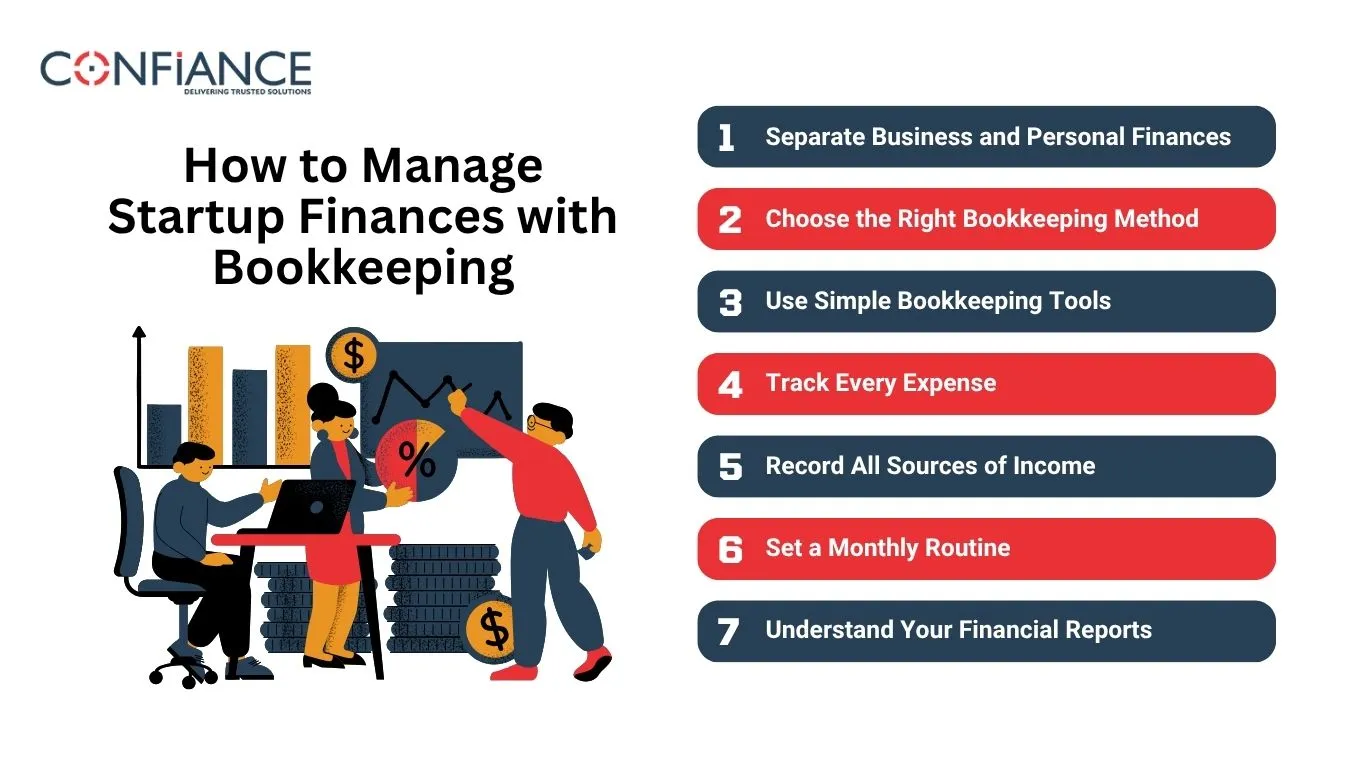
Bookkeeping for Startups – Grow Your Business in the Early Stage
Starting a new business or startup is exciting. But without clear financial records, even the best ideas can stall. Bookkeeping helps startups stay organized, plan better, and avoid tax issues. If you want to grow your business, you need to manage your books from day one. Bookkeeping for startups matters a lot, and in this blog we will understand why.
Why Bookkeeping Matters for Startups
Startups move fast. Expenses pile up. Revenue is uncertain. Without a record of what comes in and what goes out, it's easy to lose control. Bookkeeping for startups can give you a snapshot of your business health. It helps track income, monitor costs, and make better decisions. It also supports funding goals, improves tax accuracy, and builds trust.
How to Manage Startup Finances with Bookkeeping
1. Separate Business and Personal Finances
Open a business bank account. Use it only for company expenses. This avoids confusion and keeps your records clean. It also makes it easier to track write-offs, prepare for taxes, and show your business is legitimate.
2. Choose the Right Bookkeeping Method
There are two main types: cash and accrual. Cash records when money changes hands. Accrual records income and expenses when earned or incurred. Most startups begin with cash bookkeeping. Switch to accrual if you grow or handle large orders, offer credit, or need more detailed reports.
3. Use Simple Bookkeeping Tools
You don't need complex software at the start. Use spreadsheets or basic accounting apps like Wave, Zoho Books, or FreshBooks. These are affordable and easy to learn. As you grow, you can move to tools like Xero or QuickBooks. Automation saves time. Software helps reduce human errors, tracks payments, and links with banks.
4. Track Every Expense
Log everything. Office rent, domain name, software fees, internet bills, and coffee shop meetings all count. Small costs add up. Keeping receipts helps with audits and tax filings. Use mobile apps to scan and store receipts.

5. Record All Sources of Income
Log every dollar. Note who paid, when, and for what. This keeps your records clean and helps spot unpaid invoices. Include income from services, products, affiliate earnings, and grants.
6. Set a Monthly Routine
Review your books at least once a month. Reconcile your bank accounts. Check if any payments are missing. Spot any spending that looks off. Update your records, review your income, and make sure everything is up to date.
7. Understand Your Financial Reports
You don’t need to be a CPA. But learn the basics. The income statement shows profit or loss. The balance sheet lists what you own and owe. The cash flow statement shows money coming in and going out. These reports show where your startup stands. Use them to guide decisions.
Key Bookkeeping Tips for New Founders
- Always backup your records
- Use cloud tools for easy access
- Track mileage if you travel for business
- Send invoices on time
- Follow up on unpaid invoices
- Save for taxes as you earn
- Keep digital copies of receipts
- Set calendar reminders for key tasks
When to seek external help
Doing your books can take time. Once you have regular sales or raise funds, hire a bookkeeper. A professional will free up your time and avoid costly errors. If you’re not ready for full-time help, try virtual bookkeeping services. Freelancers and agencies offer flexible plans.
Look for someone who understands startup needs. They should know your industry and be comfortable with your tools. Ask for references and review their certifications.
Avoid These Common Startup Bookkeeping Mistakes
- Mixing personal and business spending
- Ignoring small expenses
- Not saving for taxes
- Forgetting to invoice clients
- Skipping account reconciliations
- Not keeping backup records
- Misclassifying expenses
- Not checking profit margins
- Waiting too long to get help
These mistakes can hurt your business later. Fixing them early is easier than dealing with penalties. Accurate bookkeeping avoids stress and saves money.
How Bookkeeping for Startups Helps You Grow
Clear records mean better choices. You can see what products sell well, which services cost more, and where you can cut spending. Investors also want clean books. They won’t fund a business that can’t track its money.
Bookkeeping also helps you:
- Plan budgets
- Set sales goals
- Understand cash flow cycles
- Prepare for tax season
- Stay ready for audits
- Avoid late fees and penalties
- Get funding or loans
With updated books, you can act fast. You know what you can spend and what you need to earn. This helps you move with confidence.
Bookkeeping and Taxes
Tax rules can be strict. With clean records, filing is smoother. Keep track of:
- Revenue
- Expenses
- Receipts
- Payroll (if you hire staff)
- Business-related travel
- Depreciation and assets
- Contractor payments
Save all your financial records. Keep them for at least five years. This protects you if questions come later. If your records are digital, back them up to the cloud.
Consider hiring a tax advisor during your first tax season. They can check your records and make sure everything is done right. They also help with deductions.
Bookkeeping Software Options for Startups
Some tools are built for startups. Here are a few that work well:
- Wave: Free, basic features, good for solo founders
- Zoho Books: Great for small teams, affordable pricing
- FreshBooks: Simple interface, easy for non-accountants
- Xero: Strong reporting, good for growing teams
- QuickBooks: Broad features, good if you need payroll and inventory
Choose a tool that fits your needs now, not just later. Try free trials before you commit. Pick one that works on mobile and syncs with your bank.
When You Should Move to Full Accounting
Bookkeeping is about tracking. Accounting adds strategy. You’ll need full accounting when:
- You raise outside money
- You have payroll
- You handle inventory
- You file taxes in multiple states or countries
- You expand to international markets
Accountants can help with budgeting, tax planning, and business structure. But they need clean books to do their job well. If you want to forecast future income, improve margins, or set financial goals, you need more than just bookkeeping.
How to Manage Startup Finances Daily
Start each week with a review. Check your cash balance. List bills due soon. Follow up on unpaid invoices. Pay vendors on time. Review credit card charges. Look for spending that can wait.
Track every transaction. Don’t assume small charges don’t matter. Use your software daily. Set time aside each week to catch up. This avoids a backlog.
Budget your monthly spend. Plan for software subscriptions, office supplies, marketing, and team expenses. Keep an emergency fund. Even a few months of savings helps in a slow season.
Bookkeeping for Different Startup Types
SaaS startups track recurring income and upgrades. Bookkeeping must show monthly revenue, churn, and cost of service.
Ecommerce startups need inventory tracking. They record sales tax, returns, platform fees, and shipping.
Service-based startups track time and invoice for hours. They also log project costs and client payments.
Each type needs tailored tracking. But the core ideas stay the same: log income, track costs, stay organized.
Bookkeeping for startups is not about perfection. It's about clarity. With clear records, you make smarter choices, save time, and grow faster. Even if your startup is just getting off the ground, good books give you a strong base.
Start small. Stay consistent. Ask for help when you need it. And keep your numbers clean from day one.
The way you manage startup finances today affects your future. Bookkeeping for startups helps build trust, raise funding, pay taxes, and plan for growth. If you want to do it right from the start, connect with Confiance now! We have helped multiple startups scale their business with our cost-effective bookkeeping services.
FAQs
- What is the best way to manage finances for a startup?
Start by separating personal and business accounts. Use bookkeeping software, track income and expenses, and review financial reports monthly. Set aside money for taxes and plan your budget each month. - Do startups need a bookkeeper in the early stage?
Not always. Many founders manage basic bookkeeping themselves. But if your finances get complex or time becomes an issue, hiring a bookkeeper saves time and avoids errors. - Which bookkeeping method is best for startups?
Most early-stage startups use the cash method because it's simple and tracks money when it changes hands. Switch to accrual if your business grows or needs detailed reporting. - How often should a startup update its books?
Update your records weekly. Reconcile your bank accounts and review reports monthly. This keeps your finances accurate and ready for decisions, taxes, or audits. - Can I use free tools for startup bookkeeping?
Yes. Tools like Wave, Zoho Books, or spreadsheets can work well for small teams. Upgrade later to paid software like Xero or QuickBooks as your needs grow. - What are the common bookkeeping mistakes startups make?
Mixing personal and business expenses, not saving for taxes, missing receipts, and not invoicing on time. These small issues can lead to big problems later.
